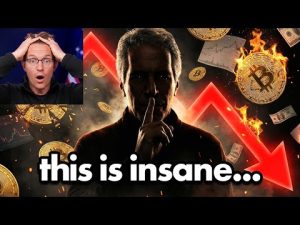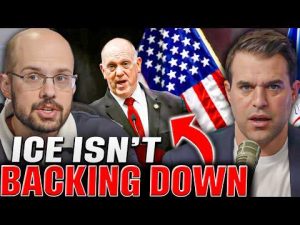**Stock Market Roller Coaster: The Trump Effect and Media Misunderstandings**
Recently, the stock market has been on quite the emotional ride, resembling more of a roller coaster than a stable investment platform. This wild trip began when rumors circulated that Donald Trump was contemplating a 90-day pause on trade tariffs. Initially, stocks jumped back up in excitement—who doesn’t love a little optimism? But wait! Just when it seemed the market was ready for a glorious climb, it took a nosedive, losing around 200 points. Confused? So is everyone else.
The drama unfolded when a social media user decided to interpret an interview with an unnamed Trump official, claiming that the pause was a done deal. This little snippet of news quickly found itself misinterpreted and misreported by various media outlets, sending investors into a frenzy. Meanwhile, the National Economic Council Director, while simply commenting on the possible pause, was the catalyst for a market reaction that no one really understood. What followed was a rapid reversal—just like that, the White House stepped in, declaring the entire narrative of a 90-day pause as “fake news.” Talk about whiplash!
Now, one can’t help but chuckle at how quickly the stock market reacted to a combination of hearsay and media miscommunication. Isn’t it interesting that the fate of countless financial portfolios can pivot upon a game of telephone? It certainly shows just how twitchy investors can be, especially when emotions grip the market. Remember the stock market fluctuations after the COVID shutdown? It was almost as if an unseen hand was playing a puppet master, and now the same seems to be happening with crumbly claims of tariffs.
Looking back at past economic downturns reveals an intriguing trend. Major events like the housing crisis or COVID originated from different conditions but were generally perceived as unexpected plummets. However, in the eyes of the average American, this recent decline may feel more connected to the tariff discussions. There’s something to be said about how the narrative spun by media influences public sentiment. If the little guy starts believing that tariffs triggered this latest dip, it could spell trouble for political movements, especially if Trump is unfairly branded the villain of the piece.
Despite the economic tumult, many analysts are reviewing previous patterns and wondering if this current downturn is tied to an underlying weakness similar to past crises. For years, people have argued about the economic ups and downs under various administrations. Right now, though, the stock market’s erratic behavior is all about perception, rather than solid economic fundamentals. With interest rates plumbing new lows and so much “funny money” floating around, investors are left to sift through a complex mix of numbers and assumptions, leading to confusion and a sense of unease about the future.
In the end, the stock market’s current tantrum serves as a sobering reminder of how widely interpretation can vary, particularly within the effervescent world of social media and news. As markets react to half-realized news, one must wonder—who’s really behind the wheel? It seems that whether you’re trying to beat a horse in a race or navigating the unpredictable landscape of stocks, the odds hang heavy against you. So, hold onto your hats, folks; with the current fluctuations, it looks like this financial roller coaster is just warming up!







